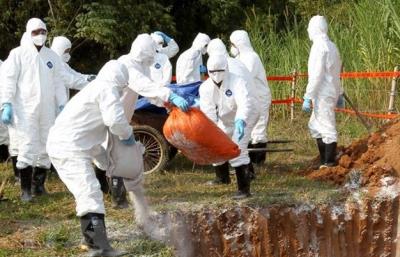 A team from Kansas State University evaluated biosecurity procedures in Vietnam that reported over 9,000 outbreaks of African swine fever (ASF) through early November 2019. The purpose of the study* was to ascertain possible recovery of ASF virus from feed ingredients, mixed feed, the feedmill environment and delivery vehicles. A secondary component to the study was to determine the frequency of isolation of ASF virus appliying PCR on samples from vehicles used to transport hogs.
A team from Kansas State University evaluated biosecurity procedures in Vietnam that reported over 9,000 outbreaks of African swine fever (ASF) through early November 2019. The purpose of the study* was to ascertain possible recovery of ASF virus from feed ingredients, mixed feed, the feedmill environment and delivery vehicles. A secondary component to the study was to determine the frequency of isolation of ASF virus appliying PCR on samples from vehicles used to transport hogs.
Conclusions from the study were:
- Feed ingredients were not contaminated with ASF virus.
- Feed was not contaminated, although it was pelleted and Kemin Sal-Curb (™) was added as a virucidal agent.
- ASF virus was not generally recovered from environmental swabs within feed plants. A recovery rate of 0.5 percent was obtained. The positive sample was obtained from an area where truck drivers congregated. One percent of the samples from the cabs of feed delivery vehicles yielded ASF but a lower proportion from the exterior of feed delivery trailers.
- Company-owned hog transport vehicles yielded 10 percent positives from cabs, although no positives were obtained from the exterior surface or tires of trucks that had been decontaminated.
- In contrast, 14 percent of samples were positive from vehicles operated by owners of hogs delivering animals to a transit center from small farms. All positive samples were obtained from surfaces in vehicle cabs.
The results obtained by the investigators suggest that appropriate mill biosecurity will eliminate feed manufacture as a source of ASF virus. Obviously transport of live hogs is associated with a higher risk of transmission.
 The results of the investigation in Vietnam could be applied to the U.S. in devising programs to prevent introduction and dissemination of avian influenza (AI). With respect to the egg-production industry, mash feed that is fed has not been subjected to a heat treatment. Inclusion of formaldehyde additives will effectively suppress non spore-forming bacterial pathogens and many viruses, but at the expense of potency of some enzyme additives. Feed mills located within production complexes should not present a problem if self-contained.
The results of the investigation in Vietnam could be applied to the U.S. in devising programs to prevent introduction and dissemination of avian influenza (AI). With respect to the egg-production industry, mash feed that is fed has not been subjected to a heat treatment. Inclusion of formaldehyde additives will effectively suppress non spore-forming bacterial pathogens and many viruses, but at the expense of potency of some enzyme additives. Feed mills located within production complexes should not present a problem if self-contained.
Central feed mills supplying contract turkey and broiler parent and growout farms represent a risk of disseminating AIIntroduction of avian influenza into any single farm may conceivably be disseminated within the complex unless appropriate biosecurity procedures are followed.
Given the results of the study in Vietnam on ASF it would appear that vehicle delivery drivers must follow appropriate biosecurity procedures to prevent contamination of cabs that are obviously difficult to render non-infectious. Disposable outer clothing and footwear, the use of washable floor mats, and common sense precautions should reduce the likelihood of transmitting infection from an affected farm through a complex.
*Gebhardt, J.T. et al, Lessons Learned from Preliminary Monitoring for African Swine Fever Virus in a Region of Ongoing Transmission. JAVMA.258:35-38 (2021).